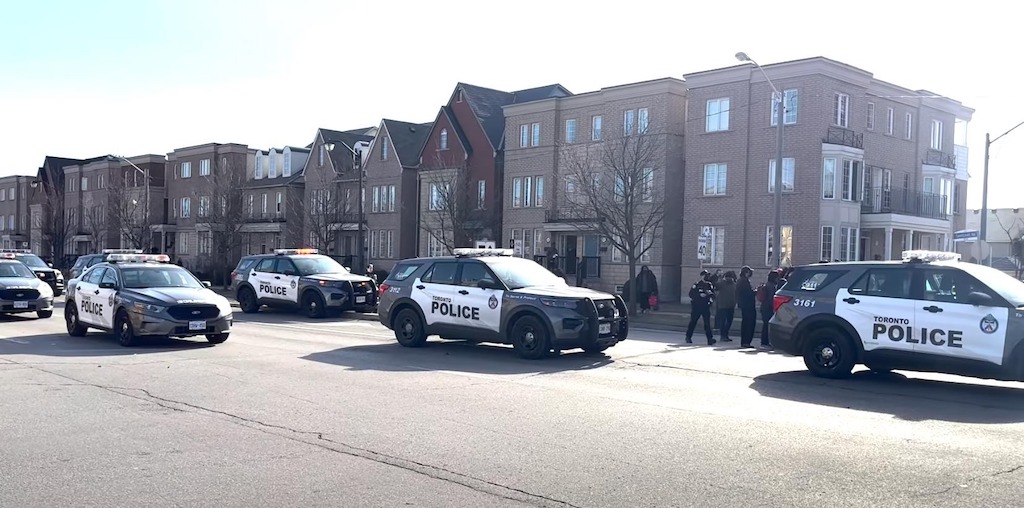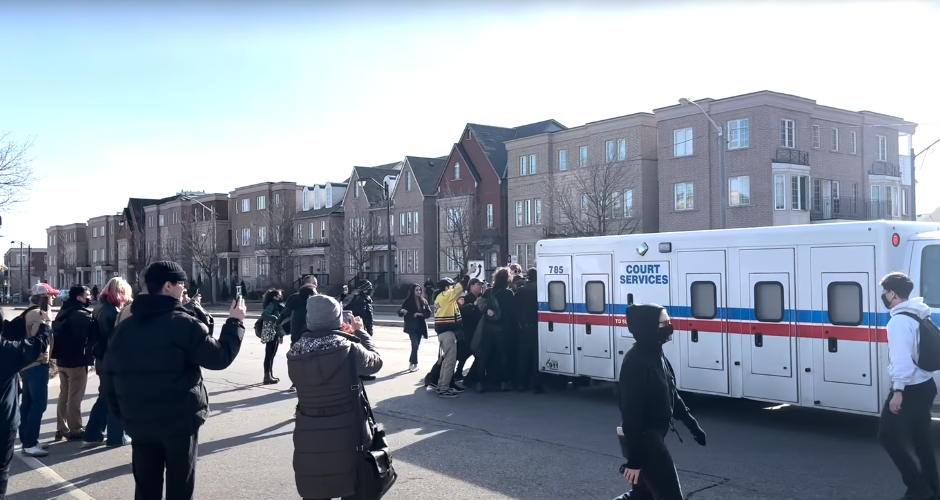
Toronto Police Arrested A Striking Worker At York University. Labour Experts Are Concerned Police Infringed on Charter Rights.
Police charges of ‘mischief’ criminalizes charter protected activities, experts warn.
After Toronto police arrested a striking York University worker earlier this month, labour experts are concerned that police are criminalizing workers exercising their charter right to strike.
York University contract faculty, teaching assistants, graduate assistants, part-time librarians and archivists have been on strike since February 26 fighting for improved wages, job security and better working conditions.
The York workers’ arrest comes one month after Ottawa police were criticized for arresting a high profile labour leader during a rally in support of striking workers.
The Toronto Police Service arrested a picket captain at a CUPE 3903 picket line at York University on March 4 and charged the worker with mischief. TPS officers also assaulted several workers, as first reported by Desmond Cole for Yes, Everything.
“This was a really blatant attack on labour rights,” Tanya Dushatska, a PhD student and rank and file member of CUPE 3903, told PressProgress. “This is setting a really dangerous precedent for other unions and organizations in Canada.”
“If the right to picket, which is an integral part of the right to strike, is being threatened, this is going to have quite bad consequences for labour unions.”
CUPE 3903 members will hold a rally at Sentinel Road, the location of the arrest, on Monday, March 25 in protest of the police crackdown.
Police are trying to demoralize striking workers at @YorkUniversity. The ability of teaching assistants, graduate students, and contract faculty to picket is under serious attack
This Monday, please join us to show support and amplify the demands of @CUPE3903York pic.twitter.com/KvcC4po25H
— Negro Frolics (@DesmondCole) March 21, 2024
In addition to witnessing the arrest on March 4, Dushatska saw three instances of police assaulting York University workers on strike.
In one instance, TPS officers allegedly pushed a worker against the back of a vehicle while that vehicle was backing up, Dushatska said. A court services vehicle slowly backing into a group of workers was also recorded on a video posted online.
“That was very disturbing. I don’t think that person was seriously injured. I talked to him later and he seemed okay, but it was very, very alarming.”
TPS officers also allegedly grabbed one worker and threw him across the road “quite violently,” Dushatska recalls.
“There was another person I saw that was punched in the stomach by a police officer. He was struggling not to throw up afterwards. I think he was also not too seriously injured, but of course, very, very disturbing.”

Toronto Police Service at York University picket line, March 4, 2024. Screenshot of video posted by user Teka Nai on YouTube.
More cases of police aggression came to light the following day.
“When we returned to the line on Wednesday, there were several other people who were there who were showing us the bruises that they got from being grabbed or shoved by police,” Dushataska said.
In a statement to PressProgress, TPS did not confirm or deny allegations officers had assaulted workers, but rather stated: “There were no reports of injuries at the event.”
Monday, March 4 was the second time police forced CUPE 3903 to relocate a picket line, Dushatska noted.
On Friday, March 1, TPS showed up to a York picket line on Pond Road and forced the union to relocate, although there were no arrests or altercations that day. Now, the union is picketing in two smaller, less visible locations.
“I definitely do not think that where we’ve been forced to move is having the same kind of impact that our previous location did,” Dushatska said.
The police action has also created a chill on the picket line, with some workers, including international students, fearful to show up as a criminal charge could result in deportation and other life-altering consequences.
York University did not return PressProgress’ request for comment.
Public Property Picketing is Protected
Sentinel Road at York University has been a standard picket line location for the past 23 years, according to the union. However, Dushatska said the land had recently been sold by York and was now public property, which the police used to justify the crackdown.
“Earlier that morning, officers engaged with demonstration organizers and asked specifically that city roads be kept clear,” The TPS said in a statement to PressProgress.
Dushatska said workers brought down the line and consulted with CUPE’s lawyers, who then advised the police that the workers were within their rights to picket at that location. The workers decided at 3 PM to resume the picket line.
The picket captain was arrested immediately, without warning, as soon as he stepped onto the road, Dushatska says.
The TPS gave PressProgress a slightly different account: “Officers gave demonstrators the opportunity to clear the roadway, but an individual refused and was arrested. He was charged with Mischief and released with a court date.”
Like protesting, picketing is a charter protected right, and courts recognize that interference with both employer and public property is expected.
The York university picket was also a soft picket, meaning workers still let vehicles pass through after sharing information about the strike. The workers also had opened a lane for emergency vehicles. The workers also used metal gates—common at picket lines—to protect themselves from vehicles, as York picketers had been struck several times in the past.
“Mischief” Charges Criminalize Picketing
York University Labour Professor David Doorey criticized the Toronto Police’s actions online saying, “Absolutely nothing good will come of this.”
If this is story of why police arrested a picketer at @YorkUniversity then we’re dealing with a rogue police department breaking from the norm.
Absolutely nothing good will come of this.
York itself should be questioning the police behaviour. Situation is going to get worse. https://t.co/MujtIYU2Bl
— David J. Doorey🇨🇦 💙 (@TheLawofWork) March 6, 2024
While Canadian police have an “often bloody” history of intervening in labour disputes throughout the last century, Doorey notes, but adds that police have largely adopted neutrality in labour disputes – especially after the 2015 Supreme Court Decision that affirmed workers’ right to strike.
“Neutrality means that the police do not get involved in labour picketing unless there is violence, safety concerns, or property destruction,” Doorey told PressProgress.
However, recent cases of workers facing criminal charges have raised concerns.
“There is anecdotal evidence accumulating that some police forces are moving away from this position of neutrality and more aggressively restraining picketing through the use of the very malleable application of criminal mischief,” Doorey said.
PSAC leader Alex Silas was arrested and charged with mischief during a rally in Ottawa last month. In 2020, 14 Unifor members, including Unifor national president Jerry Dias, were also arrested and charged with mischief during a police crackdown on a picket line in Regina.
Ottawa Police using ‘intimidation tactics’ against striking workers, Canada’s biggest federal public sector union says
Human rights advocates say labour leader’s recent arrest highlights ‘threatening and chilling’ trend by Ottawa Policehttps://t.co/LgRNgmcJRo #canlab #ottnews
— PressProgress (@pressprogress) February 15, 2024
“Mischief involves interference with the use, enjoyment, or access to property,” Doorey explains. “By its very nature, picketing is intended to disturb access to the employer’s property.”
“If applied broadly, criminal mischief could be applied in almost any situation involving effective labour picketing.”
“By acting in this way, the police become conduits for the employer by attempting to undermine the effectiveness of picketing. This is the opposite of neutrality.”
Police intervention also shifts the labour dispute from civil courts to the criminal courts, Doorey adds. Civil courts must balance the right to strike with the employer’s economic interests, meaning the courts can restrict a picket line’s activity, but rarely shut down a picket line entirely.
“In other words, the courts grant picketers the right to commit mischief, within reason,” Doorey said.
Police intervention, however, creates “a chill over picketing that may cause workers to fear engaging even in the most benign of effective picketing strategies.”
Police and Employer Accountability Needed
Charles Smith, labour professor at University of Saskatoon, says police intervention in labour disputes needs “public debate and discussion” to hold employers and police accountable.
“I do think we run into problems when the default is for employers or for the government to simply just call the police and clear them out,” Smith told PressProgress.
Smith also notes the inherent power imbalance in labour disputes where employers can rely on both police and the courts to protect their economic interests in ways that workers cannot.
“In any labor disputes historically, going back 100 years, there’s no one instance of a union ever calling the police on the employer. And why would they, right? Because they don’t have the protection that our system provides property owners.”
“There’s never been an instance, nor can we even imagine a situation, where you unions call for an injunction against an employer with regards to picketing.”
“We’re talking about an uneven power balance to begin with.”
Our journalism is powered by readers like you.
We’re an award-winning non-profit news organization that covers topics like social and economic inequality, big business and labour, and right-wing extremism.
Help us build so we can bring to light stories that don’t get the attention they deserve from Canada’s big corporate media outlets.
Donate



